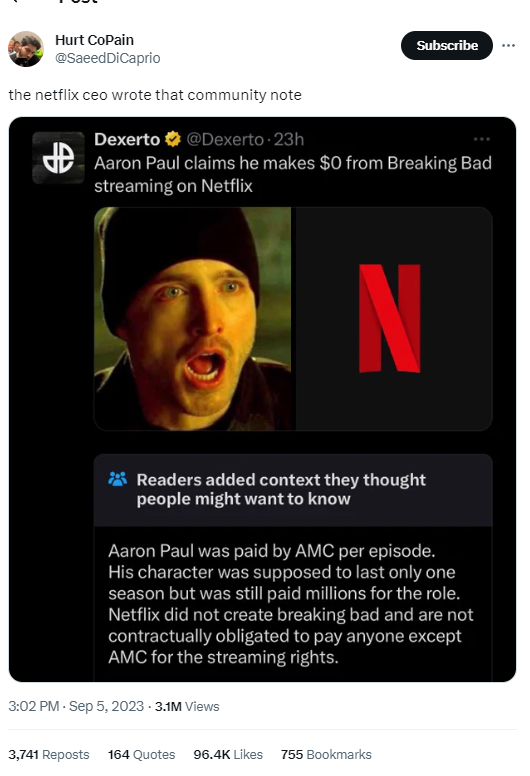this post was submitted on 06 Sep 2023
200 points (100.0% liked)
Movies & TV
22885 readers
60 users here now
Rules for Movies & TV Discussion
-
Any discussion of Disney properties should contain a (cw: imperialism) tag. If your post isn't tagged appropriately it will be removed.
-
Anti-Bong Joon-ho trolling will result in an immediate ban from c/movies and submitted to the site administrators for review.
-
On Star Trek Sunday only posts discussing how we might achieve space communism are permitted. Non-Star Trek related content will be removed and you will be temporarily banned until the following Sunday.
Here's a list of tons of leftist movies.
founded 4 years ago
MODERATORS
you are viewing a single comment's thread
view the rest of the comments
view the rest of the comments

Huh?! This is a shit take and mind bogglingly ignorant. Your logic is even flawed.
How are residuals controversial? In the arts it is standard performers, artists, and writers to get some form of royalty due to their work being so fungible.
Exactly! It's a barn and not a fully fungible product like a painting, photo, music, movie, television show, or book. The barns value is easy to determine and negotiate the price of up front. That farmer can't take that barn the worker builds and copy it literally a billion times depending on how popular it turns out to be with farm livestock. If the farmer wants another barn, they have to hire the worker again.
With products of the arts the fair value of a performer, artist, or writers labor cannot be fully known until after the end product has been distributed and that determination of value is even further complicated by the product being fully fungible.
For union projects, the producers, which is whoever is paying the crew at any given time, pays an additional percentage based on revenue into what is called the lAP. This is in addition to their nominal pension benefits.
To quote Mao Tse Tung:
The fungability of art and entertainment is not a point I had even thought of before that, because I wasnt really sure how to respond to the barn point myself. Cool.
Yeah. It's not even like software where the value can often be roughly estimated upfront based on features/scope and the end product will always require steady maintenance work to keep in a useable state. A lot of art if successful is an evergreen fungible product, which further separates it from fungible media such as writing by a journalist whose product often only has significant value during the time period of its initial publication.
Am I not allowed to ask questions as part of my investigations?
I personally work in two creative fields (photography and software design) and in neither case are royalties a normal thing. If I take photographs of your new product so you can advertise it or build a website to help you sell it then I'm paid for the job I do, not based on the amount of money you make afterwards. The full value of my creations cannot be determined until years afterwards, but that doesn't change anything.
The value of labour is not always dependent on the value of the finished product. If it was then a truck driver hauling a load of computer parts would be paid hundreds of times more than one hauling grain.
There is nothing wrong with choosing to be paid royalties, but there isn't an automatic entitlement to them on moral grounds. Choosing to sell your labour or creative works for a fixed fee is a perfectly valid option, but if you do you shouldn't complain when the farmer starts using the barn as a restaurant and starts making ten times more money from it
So I'm not really well read at all, but for the sake of learning I'll try to engage.
In your point about the barn becoming a restaurant, one thing to consider is the status of the building does not change without additional labour. This is what would be compensated for and at some agreed upon rate. As well, the nature of how a restaurant works is not the same as a creative work I think. If the barn was considered a piece of art and appraisals were being done, I think that would be a different story and you could imagine there would be some contention over whether the builder would be compensated additionally, perhaps through acknowledgment (which could be the causus belli for the builder and may be vehemently opposed) of their work being the at the very least involved in the cause of the thing that is being appraised.
its not about moral grounds. its about class struggle and the bare minimum for a union is defending hard won gains for the working class. your example with the truckers doesn't translate because no union truckers (that I know of) have had such a battle won that would guarantee residuals on what is being transported. what is not a winnable battle in one sector is a winnable battle in another. the question really is which side of the fight are you on?
if you are a small business owner you are not in the same position as a worker that is part of a union that has a negotiated contract, so I can see how you think you have no leg to stand on when asking for residuals but what it ultimately comes down to is always leverage and with collective action workers have more leverage than you would on the open market as a freelancer, for example
that said, though, there are attempts at unionizing platform freelance workers such as people that work through platforms such as fiver or upwork, etc. i haven't kept up on how well they are going but you could reach out to union organizers where you are located to talk to them about that